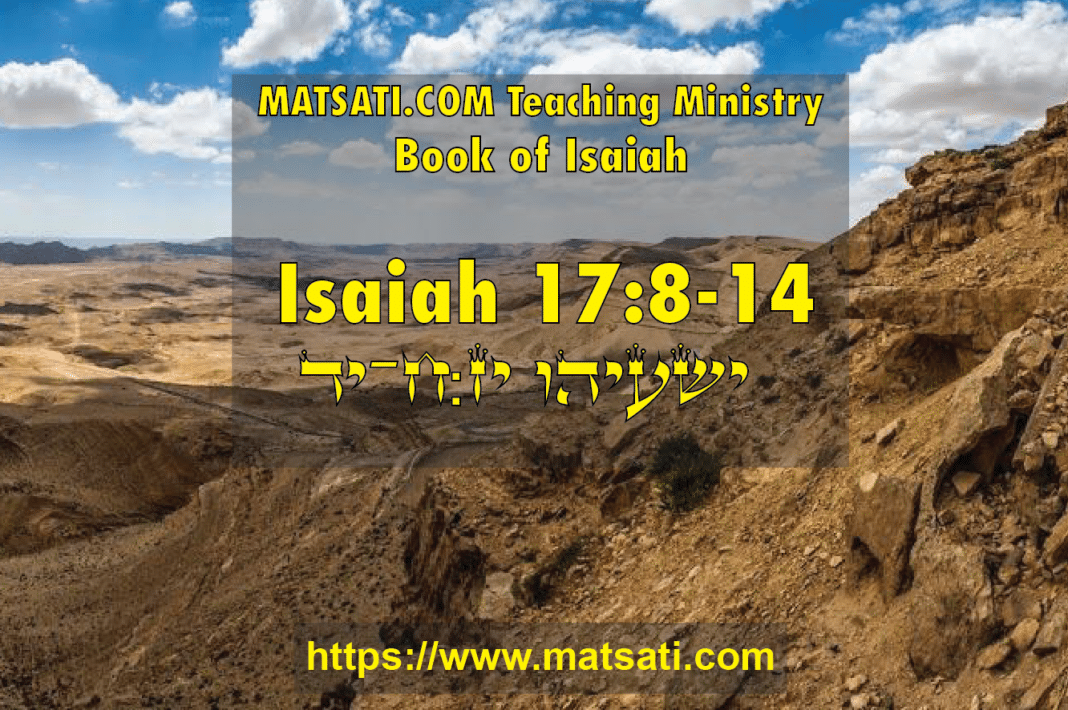Isaiah 17:8-14
According to Isaiah 17:7, the prophet is speaking of the people coming to the Lord God of Israel, since the people are not able to rely upon their own strength (note Jeremiah 17:5-10 (i) cursed is the man who trusts in man, (ii) cursed is the man who makes the flesh/body his strength, (ii) cursed is the man whose heart turns from the Lord.), and so Israel will return to the Lord, look upon their Maker, and walk in His ways seeking His Word for their lives. Most modern Christian commentators argue that Isaiah 17:7-8 are misplaced, or redacted verses and use various arguments to justify their position. The arguments center around the word for “Maker” and interestingly, Hosea 8:14 uses this same language, placing this contemporary prophet and use of language within the same timeframe Isaiah.
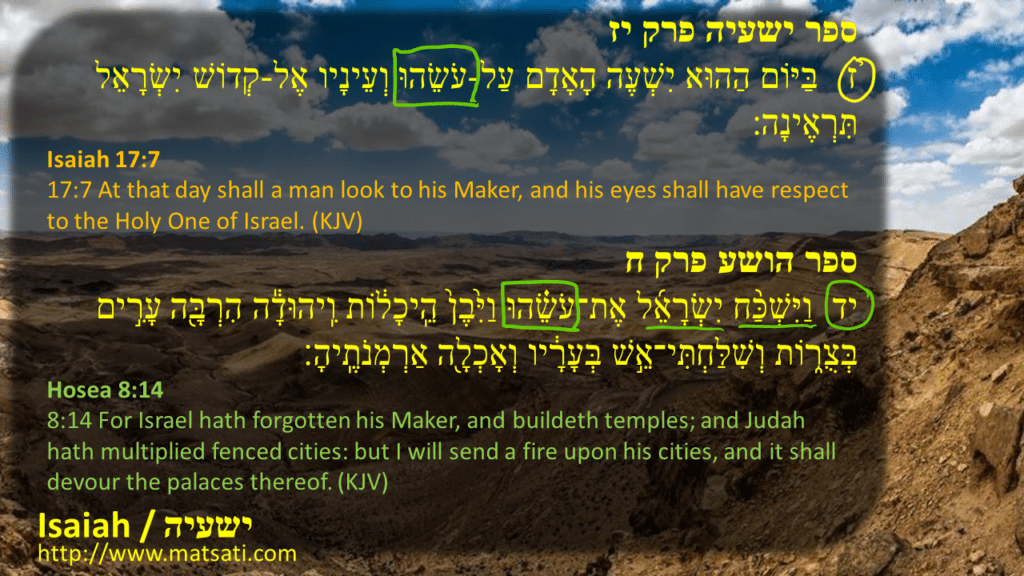
ספר ישעיה פרק יז
ז בַּיּוֹם הַהוּא יִשְׁעֶה הָאָדָם עַל-עֹשֵֹהוּ וְעֵינָיו אֶל-קְדוֹשׁ יִשְֹרָאֵל תִּרְאֶינָה:
Isaiah 17:7
17:7 At that day shall a man look to his Maker, and his eyes shall have respect to the Holy One of Israel. (KJV)
ספר הושע פרק ח
יד וַיִּשְׁכַּ֨ח יִשְׂרָאֵ֜ל אֶת־עֹשֵׂ֗הוּ וַיִּ֙בֶן֙ הֵֽיכָל֔וֹת וִֽיהוּדָ֕ה הִרְבָּ֖ה עָרִ֣ים בְּצֻר֑וֹת וְשִׁלַּחְתִּי־אֵ֣שׁ בְּעָרָ֔יו וְאָכְלָ֖ה אַרְמְנֹתֶֽיהָ׃
Hosea 8:14
8:14 For Israel hath forgotten his Maker, and buildeth temples; and Judah hath multiplied fenced cities: but I will send a fire upon his cities, and it shall devour the palaces thereof. (KJV)
We note the context of Isaiah 15, 16, and 17, of these nations going to their gods for help, ascending to the high places weeping and praying and with no response. It makes sense that Isaiah would return to this aspect of these nations who follow false gods. Even John Oswalt’s commentary questions these verses whether they are authentic or not. He allows for the possibility that there was an editor that modified the text, explicitly forgetting the Jewish importance and scribal tradition to preserve the original text. Again, this appears to be a lack of faith in God who is able to inspire all of the words of Isaiah! (The reason these commentators discuss the text being redacted or edited is most likely due to research funding. In order to keep funding coming in, new research needs to continue to be published, etc.)
Isaiah goes on saying the following according to Isaiah 17:8.

ספר ישעיה פרק יז
ח וְלֹא יִשְׁעֶה אֶל-הַמִּזְבְּחוֹת מַעֲשֵֹה יָדָיו וַאֲשֶׁר עָשֹוּ אֶצְבְּעֹתָיו לֹא יִרְאֶה וְהָאֲשֵׁרִים וְהָחַמָּנִים:
Isaiah 17:8 states, “And he shall not look to the altars, the work of his hands, (וְלֹא יִשְׁעֶה אֶל-הַמִּזְבְּחוֹת מַעֲשֵֹה יָדָיו וַאֲשֶׁר) neither shall respect that which his fingers have made, either the groves, or the images. (עָשֹוּ אֶצְבְּעֹתָיו לֹא יִרְאֶה וְהָאֲשֵׁרִים וְהָחַמָּנִים)” This verse from Isaiah reminds us of the Torah commands according to Shemot / Exodus 34:13 and Devarim / Deuteronomy 16:21.

ספר שמות פרק לד
יג כִּי אֶת-מִזְבְּחֹתָם תִּתֹּצוּן וְאֶת-מַצֵּבֹתָם תְּשַׁבֵּרוּן וְאֶת-אֲשֵׁרָיו תִּכְרֹתוּן:
Shemot / Exodus 34:13
34:13 But ye shall destroy their altars, break their images, and cut down their groves: (KJV)
ספר דברים פרק טז
כא לֹא-תִטַּע לְךָ אֲשֵׁרָה כָּל-עֵץ אֵצֶל מִזְבַּח יְהוָֹה אֱלֹהֶיךָ אֲשֶׁר תַּעֲשֶֹה-לָּךְ:
Devarim / Deuteronomy 16:21
16:21 Thou shalt not plant thee a grove of any trees near unto the altar of the LORD thy God, which thou shalt make thee. (KJV)
The Torah warns and commands the people not to build asherim. Here Isaiah connects these gods of the nations that are made with human hands and points to the foolishness of worshiping these idols. The text states עָשֹוּ אֶצְבְּעֹתָיו לֹא יִרְאֶה וְהָאֲשֵׁרִים וְהָחַמָּנִים “the work of his hands will not fear, and the asherim, and incense-altars.” We note that in the Canaanite religion, Asherah was the consort of El. Parallel versions of this are the Babylonian Ishtar, and the Egyptian Isis, and middle east Astarte which was Baal’s consort. These are fertility cults, and so these gods had groves of trees that surrounded their altars that were up on the high places. These fertility religions involved sexual activity, and even with the idols themselves, at least the handheld versions were phallic and could have been used in the sexual act itself. The point Isaiah is making is that there is great folly in following these gods, believing these demons of lust have some sort of power to deliver them from their enemies. Archeological findings reveal that these religions practiced their worship through phallic objects of worship. This was used by their cult-prostitutes. Today there is a twisted philosophy which is a religion of permissiveness, a “new morality,” and “situational ethics” which is indicated by the Lutheran church bringing drag-queens into their services and speaking about inclusivity. Those who bow down to the altar of this philosophy, they are the ones who are involved in creating laws and promoting the breakdown of morality and truth that we see so often on television. We note what John wrote in Revelation 2:14 how the Lord God rebukes the church at Pergamum who “taught” men to “commit fornication.” These things only leave emptiness, depression, and for those who are believers, great sorrow in their hearts due to succuming to the sexual acts. This is why Paul wrote what he did to the Corinthians saying, 1 Corinthians 6:16, “Do you not know that he who unites himself with a prostitute is one with her in body? For it is said, ‘The two will become one flesh.’” (NIV, ܐܱܘ ܠܴܐ ܝܳܕ݂ܥܺܝܢ ܐܢ̄ܬܾ݁ܘܢ ܂ ܕ݁ܡܰܢ ܕ݁ܢܳܩܶܦ݂ ܠܙܳܢܺܝܬ݂ܴܐ ܂ ܚܰܕ݂ ܗ̄ܽܘ ܦ݁ܓ݂ܰܪ ܂ ܐܱܡܺܝܪ ܓܷ݁ܝܪ ܂ ܕ݁ܢܶܗܘܽܘܢ ܬ݁ܪܱ̈ܝܗܽܘܢ ܚܰܕ݂ ܦ݁ܓ݂ܰܪ ܂)
Isaiah goes on saying the following:
ספר ישעיה פרק יז
ט בַּיּוֹם הַהוּא יִהְיוּ | עָרֵי מָעֻזּוֹ כַּעֲזוּבַת הַחֹרֶשׁ וְהָאָמִיר אֲשֶׁר עָזְבוּ מִפְּנֵי בְּנֵי יִשְֹרָאֵל וְהָיְתָה שְׁמָמָה:
Isaiah 17:9 states, “In that day shall his strong cities be as a forsaken bough, (בַּיּוֹם הַהוּא יִהְיוּ | עָרֵי מָעֻזּוֹ כַּעֲזוּבַת הַחֹרֶשׁ) and an uppermost branch, which they left because of the children of Israel: and there shall be desolation. (הַחֹרֶשׁ וְהָאָמִיר אֲשֶׁר עָזְבוּ מִפְּנֵי בְּנֵי יִשְֹרָאֵל וְהָיְתָה שְׁמָמָה)” The idea here is the trimming of a tree all except the highest branches that cannot be reached. We note that destruction, hardship, suffering, all of these things lead us to asking questions about who we are and the reasons why these things are happening. These things are meant to lead us to musar (character building) in our lives before both God and men. We are being shown here that there is a divine design, a plan from above which is for the purpose of returning to the Lord, to draw us back to faith and faithfulness. This is the Lord calling His people back for the purpose of turning away the judgment. (Hosea 11:1-2, Matthew 23:37) The phrase עָרֵי מָעֻזּוֹ כַּעֲזוּבַת הַחֹרֶשׁ “His strong cities will be like a forsaken bow” is translated slightly differently according to the LXX.
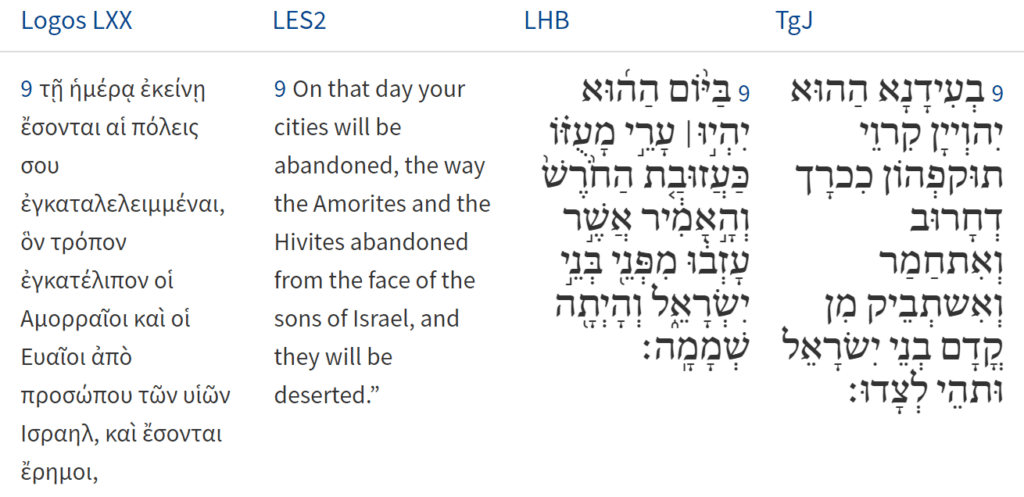
The LXX translates “like the Amorites and the Hivites” as opposed to the Masoretic text which states, “In that day shall his strong cities be as a forsaken bough, and an uppermost branch, which they left because of the children of Israel: and there shall be desolation.” The ultimate outcome is that these people groups will be destroyed because of their pride and sinful ways. These Canaanite worship centers which are located high above the planes on the mountain tops will be forsaken. So, Isaiah is saying that when one leaves from walking in God’s holy ways, the result is desolation.
ספר ישעיה פרק יז
י כִּי שָׁכַחַתְּ אֱלֹהֵי יִשְׁעֵךְ וְצוּר מָעֻזֵּךְ לֹא זָכָרְתְּ עַל-כֵּן תִּטְּעִי נִטְעֵי נַעֲמָנִים וּזְמֹרַת זָר תִּזְרָעֶנּוּ: יא בְּיוֹם נִטְעֵךְ תְּשַֹגְשֵֹגִי וּבַבֹּקֶר זַרְעֵךְ תַּפְרִיחִי נֵד קָצִיר בְּיוֹם נַחֲלָה וּכְאֵב אָנוּשׁ:
Isaiah 17:10 states, “Because thou hast forgotten the God of thy salvation, (כִּי שָׁכַחַתְּ אֱלֹהֵי יִשְׁעֵךְ) and hast not been mindful of the rock of thy strength, (וְצוּר מָעֻזֵּךְ לֹא זָכָרְתְּ) therefore shalt thou plant pleasant plants, and shalt set it with strange slips: (עַל-כֵּן תִּטְּעִי נִטְעֵי נַעֲמָנִים וּזְמֹרַת זָר תִּזְרָעֶנּוּ)” Isaiah 17:11 “In the day shalt thou make thy plant to grow, and in the morning shalt thou make thy seed to flourish: (בְּיוֹם נִטְעֵךְ תְּשַֹגְשֵֹגִי וּבַבֹּקֶר זַרְעֵךְ תַּפְרִיחִי) but the harvest shall be a heap in the day of grief and of desperate sorrow. (נֵד קָצִיר בְּיוֹם נַחֲלָה וּכְאֵב אָנוּשׁ)” These words כִּי שָׁכַחַתְּ אֱלֹהֵי יִשְׁעֵךְ “Because thou hast forgotten the God of thy salvation” reminds us of the Torah according to Devarim / Deuteronomy 8:11-12.
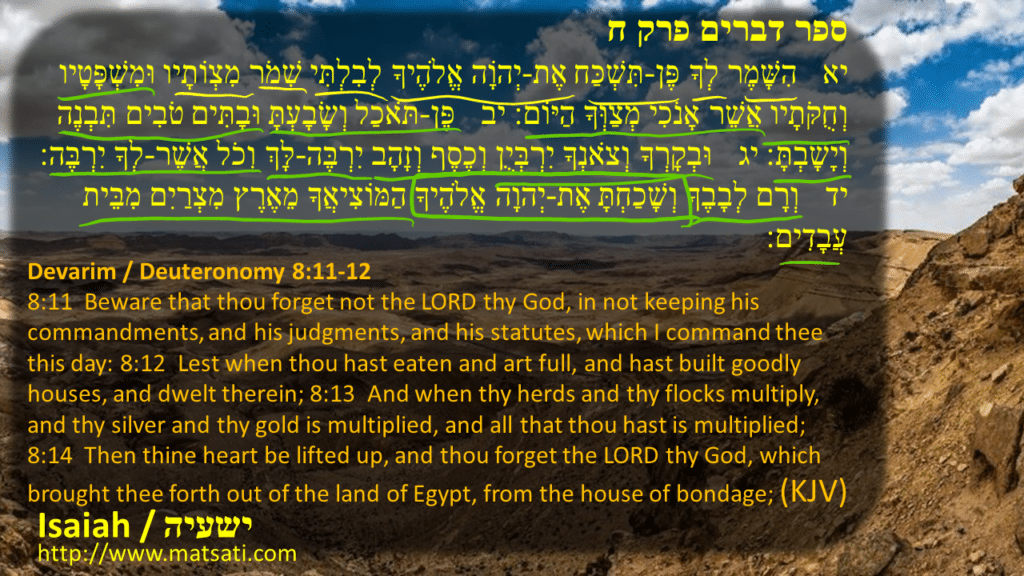
ספר דברים פרק ח
יא הִשָּׁמֶר לְךָ פֶּן-תִּשְׁכַּח אֶת-יְהוָֹה אֱלֹהֶיךָ לְבִלְתִּי שְׁמֹר מִצְוֹתָיו וּמִשְׁפָּטָיו וְחֻקֹּתָיו אֲשֶׁר אָנֹכִי מְצַוְּךָ הַיּוֹם: יב פֶּן-תֹּאכַל וְשָֹבָעְתָּ וּבָתִּים טֹבִים תִּבְנֶה וְיָשָׁבְתָּ: יג וּבְקָרְךָ וְצֹאנְךָ יִרְבְּיֻן וְכֶסֶף וְזָהָב יִרְבֶּה-לָּךְ וְכֹל אֲשֶׁר-לְךָ יִרְבֶּה: יד וְרָם לְבָבֶךָ וְשָׁכַחְתָּ אֶת-יְהוָֹה אֱלֹהֶיךָ הַמּוֹצִיאֲךָ מֵאֶרֶץ מִצְרַיִם מִבֵּית עֲבָדִים:
Devarim / Deuteronomy 8:11-12
8:11 Beware that thou forget not the LORD thy God, in not keeping his commandments, and his judgments, and his statutes, which I command thee this day: 8:12 Lest when thou hast eaten and art full, and hast built goodly houses, and dwelt therein; 8:13 And when thy herds and thy flocks multiply, and thy silver and thy gold is multiplied, and all that thou hast is multiplied; 8:14 Then thine heart be lifted up, and thou forget the LORD thy God, which brought thee forth out of the land of Egypt, from the house of bondage; (KJV)
The idea here is when prosperity comes the people will forget that it is the Lord God Almighty who gives them this blessing. This reminds us again of Jeremiah 17:5-10, about one calling a curse upon his or herself when trusting in man and making the flesh their strength. The idea here that Moshe is putting forward is warning the people not to forsake the Lord believing that it was by their own power they have these good blessings! We note that Isaiah 17:10 goes on saying, וְצוּר מָעֻזֵּךְ לֹא זָכָרְתְּ “and the rock of your strength you have not remembered (been mindful of).” It is the Lord God who is our foundation stone upon which we stand! The outcome of failing to be mindful is explained in Isaiah 17:11 which states, בְּיוֹם נִטְעֵךְ תְּשַֹגְשֵֹגִי וּבַבֹּקֶר זַרְעֵךְ תַּפְרִיחִי נֵד קָצִיר בְּיוֹם נַחֲלָה וּכְאֵב אָנוּשׁ “In the day shalt thou make thy plant to grow, and in the morning shalt thou make thy seed to flourish but the harvest shall be a heap in the day of grief and of desperate sorrow.” John Oswalt states “God wants his people to recall his unique, never-to-be-repeated acts on their behalf with the result that their present actions will be in keeping with his character.” Notice how the commentary states “never-to-be-repeated” which places a limitation on God’s ability to work a miracle in one’s life and demonstrates a lack of faith in who God is! Why couldn’t the Lord God Almighty work the same kind of miracles today? This idea of forgetting, Paul wrote about this according to 1 Corinthians 11:24-31.
1 Corinthians 11:24-31
11:24 And when he had given thanks, he brake it, and said, Take, eat: this is my body, which is broken for you: this do in remembrance of me. 11:25 After the same manner also he took the cup, when he had supped, saying, this cup is the new testament in my blood: this do ye, as oft as ye drink it, in remembrance of me. 11:26 For as often as ye eat this bread, and drink this cup, ye do shew the Lord’s death till he come. 11:27 Wherefore whosoever shall eat this bread, and drink this cup of the Lord, unworthily, shall be guilty of the body and blood of the Lord. 11:28 But let a man examine himself, and so let him eat of that bread, and drink of that cup. 11:29 For he that eateth and drinketh unworthily, eateth and drinketh damnation to himself, not discerning the Lord’s body. 11:30 For this cause many are weak and sickly among you, and many sleep. 11:31 For if we would judge ourselves, we should not be judged. (KJV, ܘܒ݂ܰܪܷܟ݂ ܘܰܩܨܴܐ ܂ ܘܶܐܡܰܪ ܂ ܣܰܒ݂ܘ ܂ ܐܱܟ݂ܽܘܠܘ ܂ ܗܳܢܰܘ ܦܱ݁ܓ݂ܪܝ ܁ ܕ݁ܥܰܠ ܐܱܦܱ݁ܝ̈ܟܾ݁ܘܢ ܡܶܬ݂ܩܨܷܐ ܂ ܗܳܟ݂ܰܢܳܐ ܗܘܰܝܬܾ݁ܘܢ ܥܳܒ݂ܕܻ݁ܝܢ ܠܕ݂ܽܘܟ݂ܪܴܢܝ ܂ܗܳܟ݂ܰܢܳܐ ܡܶܢ ܒܴ݁ܬ݂ܱܪ ܕܱ݁ܐܚܫܶܡܘ ܆ ܐܴܦ݂ ܟܴ݁ܣܳܐ ܝܰܗ̄ܒ݂ ܂ ܘܶܐܡܰܪ ܂ ܗܳܢܳܐ ܟܴ݁ܣܳܐ ܐܻܝܬ݂ܱܘܗ̄ܝ ܕܻ݁ܝܰܬ݂ܻܩܺܐ ܚܕ݂ܰܬ݂ܴܐ ܒ݁ܕ݂ܶܡܝ ܂ ܗܳܟ݂ܰܢܳܐ ܗܘܰܝܬܾ݁ܘܢ ܥܳܒ݂ܕܻ݁ܝܢ ܇ ܟܾ݁ܠ ܐܷܡܰܬ݂ܝ ܕ݁ܫܳܬ݂ܷܝܢ ܐܢ̄ܬܾ݁ܘܢ ܂ ܠܕ݂ܽܘܟ݂ܪܴܢܝ ܂ ܟܾ݁ܠ ܐܷܡܰܬ݂ܝ ܓܷ݁ܝܪ ܕܴ݁ܐܟ݂ܠܻܝܢ ܐܢ̄ܬܾ݁ܘܢ ܠܱܚܡܳܐ ܗܳܢܳܐ ܁ ܘܫܳܬ݂ܷܝܢ ܐܢ̄ܬܾ݁ܘܢ ܟܴ݁ܣܳܐ ܗܳܢܳܐ ܆ ܡܰܘܬܷ݁ܗ ܗ̄ܽܘ ܕ݁ܡܳܪܱܢ ܡܰܥ̄ܗܕܻ݁ܝܢ ܐܢ̄ܬܾ݁ܘܢ ܂ ܥܕ݂ܰܡܳܐ ܠܡܶܐܬ݂ܻܝܬ݂ܷܗ ܂ ܐܱܝܢܳܐ ܗܳܟ݂ܺܝܠ ܕܴ݁ܐܟ݂ܶܠ ܡܶܢ ܠܱܚܡܶܗ ܕ݁ܡܳܪܝܳܐ ܁ ܘܫܳܬ݂ܷܐ ܡܶܢ ܟܴ݁ܣܶܗ ܂ ܘܠܴܐ ܫܳܘܶܐ ܠܷܗ ܆ ܡܚܰܝܰܒ݂ ܗ̄ܽܘ ܠܱܕ݂ܡܶܗ ܕ݁ܡܳܪܝܳܐ ܘܰܠܦ݂ܰܓ݂ܪܷܗ ܂ ܡܶܛܾܠ ܗܳܢܳܐ ܢܶܗܘܶܐ ܐ̱ܢܳܫ ܒܴ݁ܩܶܐ ܢܰܦ݂ܫܶܗ ܆ ܘܗܳܝܕܷ݁ܝܢ ܐܴܟ݂ܶܠ ܡܶܢ ܠܱܚܡܳܐ ܗܳܢܳܐ ܂ ܘܫܳܬ݂ܷܐ ܡܶܢ ܟܴ݁ܣܳܐ ܗܳܢܳܐ ܂ ܡܰܢ ܕܴ݁ܐܟ݂ܶܠ ܓܷ݁ܝܪ ܘܫܳܬ݂ܷܐ ܡܶܢܶܗ ܟܱ݁ܕ݂ ܠܴܐ ܫܳܘܶܐ ܆ ܚܽܘܝܳܒ݂ܳܐ ܗ̄ܘ ܠܢܰܦ݂ܫܶܗ ܐܴܟ݂ܶܠ ܘܫܳܬ݂ܷܐ ܇ ܕ݁ܠܴܐ ܦ݁ܪܱܫ ܦܱ݁ܓ݂ܪܷܗ ܕ݁ܡܳܪܝܳܐ ܂ ܡܶܛܾܠ ܗܳܢܳܐ ܣܰܓܻ݁ܝ̈ܐܝܺܢ ܒ݁ܟ݂ܽܘܢ ܡܰܪ̈ܥܶܐ ܘܰܟ݂ܪܻ̈ܝܗܶܐ ܆ ܘܣܰܓܻ݁ܝܷ̈ܐܐ ܕ݁ܕ݂ܳܡܟܻ݁ܝܢ ܐܷܠܾܘ ܓܷ݁ܝܪ ܢܰܦ݂ܫܰܢ ܕܴ݁ܝܢܺܝܢ ܗ̄ܘܰܝܢ ܆ ܠܴܐ ܡܶܬ݁ܕ݂ܺܝܢܺܝܢ ܗ̄ܘܰܝܢ ܂)
What we are being presented here from Isaiah is that our actions should rooted in faith and faithfulness in the Lord God of Israel, and if our actions do not demonstrate that we truly remember what God has done, then woe is such a man. Note 1 Corinthians Paul speaks of remembering what Yeshua has done as opposed to not doing so. The idea is that God has touched our lives, and so our lives should be different. If our lives do not change for the glory of God, then our own perception is that we do not remember or recognize how the Lord God has touched us, and therefore everything we do becomes devoid of significance. Paul writes that it is because of these things that the body of believers are weak, sick, and dying, because of not living their lives in a worthy manner, specifically what Isaiah is saying here, that of not remembering the rock upon which we stand! We note that there are three references to these Scriptures from the DSS sectarian Materials: 1QHa Col. xiii:30, Col. xvi: 10, and Col. xvi: 28 that provide us with some insights into the end result of forsaking remembrance of the Lord.
| DSSSE:EN | DSSSE:Tr | DSSSE:NT |
|
1QHa Col. xiii:30 30 the charge against me with the harp, their grumblings with verses in harmony, with demolition and destruction. Resentment has taken hold of me and pangs like the labours of |
1QHa Col. xiii:30 30 בכנור ריבי ובנגינות יחד תלונתם עם שאה ומשואה זלעופות אחזוני וחבלים כצירי | 1QHa Col. xiii:30 30for which there is no charm. And it has become an incurable pain and a tormenting agony in the bowels of Your servant, causing [my spirit] to stumble and putting an end to |
| 1QHa Col. xvi:10 10 although they do not extend their root to the gully. However, he who causes the holy shoot to grow in the true plantation hides, not | 1QHa Col. xvi:10 10 ואל יובל לא ישלחו שורש ומפריח נצר ק[ו]דש למטעת אמת סותר בלוא | 1QHa Col. xvi:10 10and its branches roosts for all the birds. All the tre[es] by the water rise over it, for in their stand they grow tall, |
| 1QHa Col. xvi:28 28 to bitterness and an incurable pain which does not stop, […] over me like those who go down to Sheol, and with | 1QHa Col. xvi:28 28 למרורים וכאיב אנוש לאין עצור […]מה עלי כיורדי שאול ועם | 1QHa Col. xvi:28 28agonies. I have become like a man who is forsaken by […] there is no refuge for me. For my agony breaks out |
Note the description of tormenting agony, incurable pain, and planting vegetables and trees and such their roots will not extend. This is the outcome of assimilation, idolatry, and paganism into the faith; God’s actions to bring back that which is lost has these effects. Something of which would be unnecessary if only God’s people would remain faithful to Him and turn from their ways, repent, and seek Him!
The book “religious texts from Ugarit” cites Isaiah 17:10-11 saying, “1.5 vi 5 to the edge of the abyss; we came to ‘Paradise’ the land of pasture, to ‘Delight’ the steppe by the shore of death. We came upon Baal fallen to the earth: dead was Valiant Baal.” There appears to be a connection to a fertility religion in regard to these verses. John Oswalt writes the following:
“The description of the activity in vv. 10b and 11 is reminiscent of that attributed to the Adonis cult, where potted plants were force-bloomed and then allowed to die as symbolic of the fertility cycle of the world. This cult was a Greek version of the Tammuz worship, which is mentioned in the Bible (Ezek. 8) and which was widely practiced in the ancient Near East. The worshipers believed that by reenacting the myth of the dying and rising vegetation-god they would secure a good crop for themselves. Whether or not the particular practices of the Adonis cult are in view here (Kissane, with Skinner, cautions that the similarities are only general, not specific), it is clear that the people are seeking to supply their own needs through their own activity. Such an approach can only be the result of a prior abandoning of the God who had shown himself both willing and able to care for them. strange shoots (lit. “shoots of strangeness”) is interpreted by some as meaning “shoots of a strange (god).” They have then suggested that pleasant plants refers to the plants of (the god) Naaman (the sweet one = Adonis?). However, pleasant is used elsewhere in the book without any overtones of the divine name (32:12), and the form of strange is adjectival, not nominal (zār), so that the present reading seems preferable. Probably the reference to these exotic and beautiful plants does symbolize the lush and opulent Canaanite religion, which promised such a beautiful harvest.”
John N. Oswalt, The Book of Isaiah, Chapters 1–39, The New International Commentary on the Old Testament (Grand Rapids, MI: Wm. B. Eerdmans Publishing Co., 1986), 354.
The commentary draws out an idolatrous practice that reveals how the people attempt to force their harvest to be successful by the use of foreign gods. The end result however will be a disaster due to the Lord not blessing such practices. This draws us back again to the lack of faith and trusting in the Lord God in heaven and Jeremiah 17:5-10. The one who trusts in himself or his own actions through divination will have no success because there is no life in such things. We are called according to the Scriptures to rely upon the God of life, the life giver, the Almighty Creator, because He is the one who gives us life and this comes to those who surrender their lives to him because of the great love that He has for us!
ספר ישעיה פרק יז
יב הוֹי הֲמוֹן עַמִּים רַבִּים כַּהֲמוֹת יַמִּים יֶהֱמָיוּן וּשְׁאוֹן לְאֻמִּים כִּשְׁאוֹן מַיִם כַּבִּירִים יִשָּׁאוּן:
Isaiah 17:12 states, “Woe to the multitude of many people, which make a noise like the noise of the seas; (הוֹי הֲמוֹן עַמִּים רַבִּים כַּהֲמוֹת יַמִּים יֶהֱמָיוּן) and to the rushing of nations, that make a rushing like the rushing of mighty waters! (וּשְׁאוֹן לְאֻמִּים כִּשְׁאוֹן מַיִם כַּבִּירִים יִשָּׁאוּן)” This verse provides us with a description of a multitude of people. In Ras Shamra Parallels: The Texts from Ugarit and the Hebrew Bible, vol. 3, Analecta Orientalia, 51,pp 372, the commentary states, “Montgomery: ‘Mythological language is inserted into the historical prospect with an inimitable alliteration and syntax—like instances in the Ras Shamra texts….’ Cassuto: In this allusion to the myth of combat between God and Sea, the enemies of God are likened to the rebellious sea.” The idea here is that the multitude of invading armies is so great, it is like the noise of the seas, this has parallels to the Torah from the sense of the flood which God brought upon the world to destroy the wicked. (Bereshit / Genesis 6) The idea here of Damascus is that because of their sins the nations will be brought upon them like a flood. Same with Israel, because of her sins she will be overwhelmed. There are many references to this kind of analogy of the roaring sea to the armies, examples may be taken from the DSS 1QHa Col x:27 and xi:16, the Sibylline Oracles 1:315, 4 Ezra 11:1, and Apocalypse of Abraham 17:1 from the Pseudepigrapha. In each case the noise of the ocean and the rushing sea are used as analogies for a mass of people in an invading army or group of men. The coming hordes of the enemy are described as the roaring surf, the sound of the sea, which elicits fear in the hearts of sailors, their boats crashing upon the surf and drowning. These things are what comes to mind in regards to the grim hope that confronts those who are unrepentant and determined to walk in their own ways as opposed to humbling one’s self and trusting in the Lord.
ספר ישעיה פרק יז
יג לְאֻמִּים כִּשְׁאוֹן מַיִם רַבִּים יִשָּׁאוּן וְגָעַר בּוֹ וְנָס מִמֶּרְחָק וְרֻדַּף כְּמֹץ הָרִים לִפְנֵי-רוּחַ וּכְגַלְגַּל לִפְנֵי סוּפָה: יד לְעֵת עֶרֶב וְהִנֵּה בַלָּהָה בְּטֶרֶם בֹּקֶר אֵינֶנּוּ זֶה חֵלֶק שׁוֹסֵינוּ וְגוֹרָל לְבֹזְזֵינוּ:
Isaiah 17:13 states, “The nations shall rush like the rushing of many waters: (לְאֻמִּים כִּשְׁאוֹן מַיִם רַבִּים יִשָּׁאוּן) but God shall rebuke them, and they shall flee far off, and shall be chased as the chaff of the mountains before the wind, and like a rolling thing before the whirlwind. (וְגָעַר בּוֹ וְנָס מִמֶּרְחָק וְרֻדַּף כְּמֹץ הָרִים לִפְנֵי-רוּחַ וּכְגַלְגַּל לִפְנֵי סוּפָה)” Isaiah 17:14 states, “And behold at evening tide trouble; and before the morning he is not. This is the portion of them that spoil us, and the lot of them that rob us. (לְעֵת עֶרֶב וְהִנֵּה בַלָּהָה בְּטֶרֶם בֹּקֶר אֵינֶנּוּ זֶה חֵלֶק שׁוֹסֵינוּ וְגוֹרָל לְבֹזְזֵינוּ)” Here Isaiah states explicitly that it is the nations that rush like many waters (לְאֻמִּים כִּשְׁאוֹן מַיִם רַבִּים). Here the warriors of this invading army seem to appear formidable, but Isaiah says that וְגָעַר בּוֹ וְנָס מִמֶּרְחָק וְרֻדַּף כְּמֹץ הָרִים לִפְנֵי-רוּחַ וּכְגַלְגַּל לִפְנֵי סוּפָה “but God shall rebuke them, and they shall flee far off, and shall be chased as the chaff of the mountains before the wind, and like a rolling thing before the whirlwind.” The army will be like chaff when the Lord rebukes,
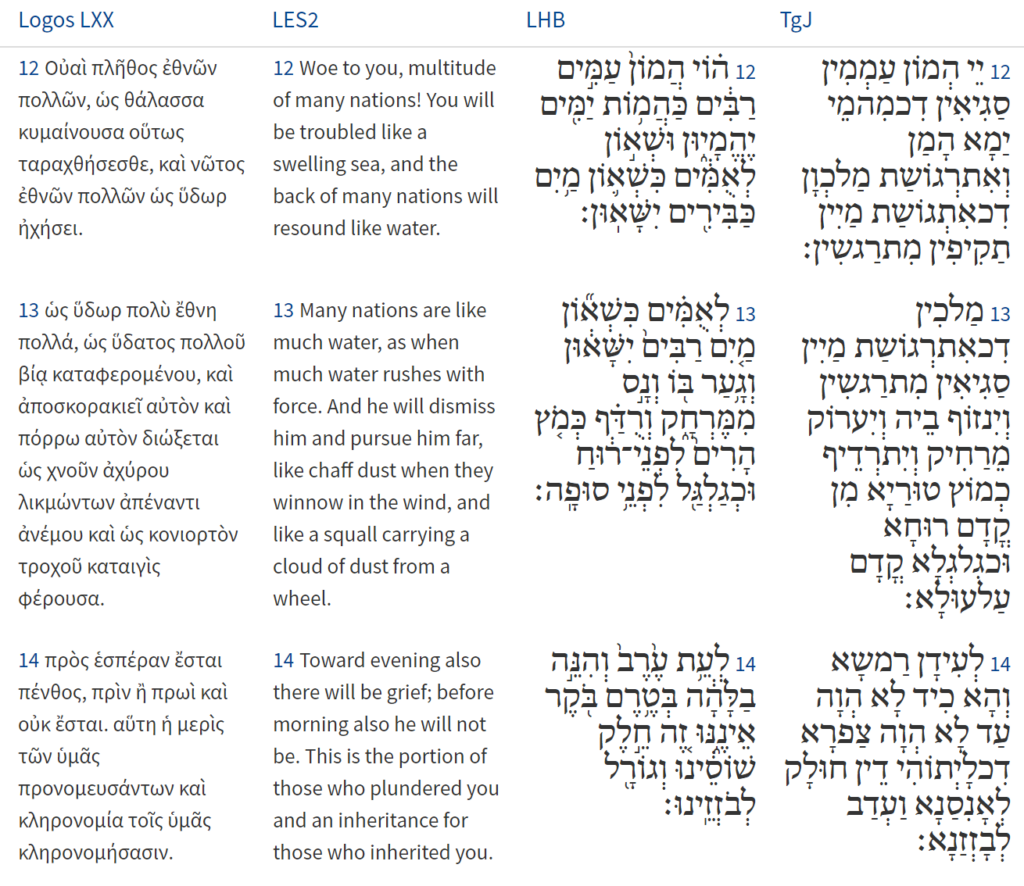
The septuagint agrees with the Masoretic text regarding the invading nation. Isaiah 17:13 states χνοῦν ἀχύρου λικμώντων ἀπέναντι ἀνέμου καὶ ὡς κονιορτὸν τροχοῦ καταιγὶς φέρουσα “like chaff dust when they winnow in the wind and like a squall carrying a cloud of dust from a wheel” speaks to the nature of those whom the Lord God rebukes, they will be as these worthless things, chaff and dust from the ground. The TgJ writes that these multitudes are the kings who roar like the roaring of many waters. The idea is that these kings are not as significant as they appear, an example of this is Sennacherib who was destroyed by the hand of God who caused him to return home and his sons to conspire against him to kill him. Other parallels may be drawn to God who is able to overcome even the Leviathan, the sea monsters according to Isaiah 27:1, 51:9, Ezekiel 29:3 and 32:2. We note that Isaiah 17:14 describes it is not Israel who will be destroyed, but the invading armies due to God’s mercy. The parallel again is to Sennacherib’s attack (Isaiah 37:36–38). To take a stand against God’s people, the end result is destruction for those who believe that God will not help His people. We note Revelation 6:9 When he opened the fifth seal, I saw under the altar the souls of those who had been slain because of the word of God and the testimony they had maintained. 6:10 They called out in a loud voice, “How long, Sovereign Lord, holy and true, until you judge the inhabitants of the earth and avenge our blood?” 6:11 Then each of them was given a white robe, and they were told to wait a little longer, until the full number of their fellow servants, their brothers and sisters, were killed just as they had been. (NIV) which provides us an example of the times in which our testimony will get us killed. There may be a time when the enemy coming against us may succeed, but this does not mean that the Lord God is not with us. These things are spoken to us beforehand such that we can have faith and believe, maintain the faith, stand strong, and even unto the point of death knowing that the victory is the Lord’s!
Rabbinic Commentary
The Targum Jonathan is an Aramaic and Rabbinic translation of the book of Isaiah and therefore is an important text for us to read in our study of the book of Isaiah.
תרגום יונתן בן עוזיאל אל ישעיה פרק יז:ח-יד
ח וְלָא יִסתְמֵיך עַל אֵיגֹורַיָא עֹובָד יְדֹוהִי וּדאַתקִינָא אַצבְעָתֵיה לָא יִתקַייַם וַאְשֵירַיָא וַחְנִסנְסַיָא׃ ט בְעִידָנָא הַהוּא יִהוְייָן קִרוֵי תוּקפְהֹון כִכרָך דְחָרוּב וְאִתחַמַר וְאִשתְבֵיק מִן קֳדָם בְנֵי יִשׂרָאֵל וּתהֵי לְצָדוּ׃ י אְרֵי שְבַקַת אְלָה פוּרקָנִיך וְדַחלַת תַקִיפָא דְמֵימְרֵיה בְסַעְדִיך לָא אִידְכַרת בְדִיל דְאַת נְצִיבָא נִצבָא בְחִירָא וְעוּבָדִין מְקֻלקְלִין אַסגִית׃ יא בַאְתַר דְאִתקַדַשתוּן לְמִהוֵי עַם תַמָן קַלקֵילתוּן עוּבָדֵיכֹון וְאַף כַד עַלתוּן לַאְרַע בֵית שְכִינְתִי תַמָן הְוָה חָזֵי לְכֹון לְמִפלַח שְבַקתוּן פוּלחָנִי וּפלַחתוּן לְטָעְוָתָא אַרחֵיקתוּן יֹום תְיוּבָא עַד דִמטָא יֹום תְבָרְכֹון בְכֵין הְוָה כֵיבְכֹון לְמַפְחָת נְפַש׃ יב יֵי הְמֹון עַמְמִין סַגִיאִין דִכמִהמֵי יַמָא הָמַן וְאִתרְגֹושַת מַלכְוָן דִכאִתְגֹושַת מַיִין תַקִיפִין מִתרַגשִין׃ יג מַלכִין דִכאִתרְגֹושַת מַיִין סַגִיאִין מִתרַגשִין וְיִנזֹוף בֵיה וְיִערֹוק מֵרַחִיק וְיִתרְדֵיף כְמֹוץ טוּרַיָא מִן קֳדָם רוּחָא וּכגִלגְלָא קֳדָם עַלעוּלָא׃ יד לְעִידָן רַמשָא וְהָא כִיד לָא הְוָה עַד לָא הְוָה צַפרָא דִכלָיְתֹוהִי דֵין חוּלָק לְאָנִסַנָא וַעְדַב לְבָזְזַנָא׃
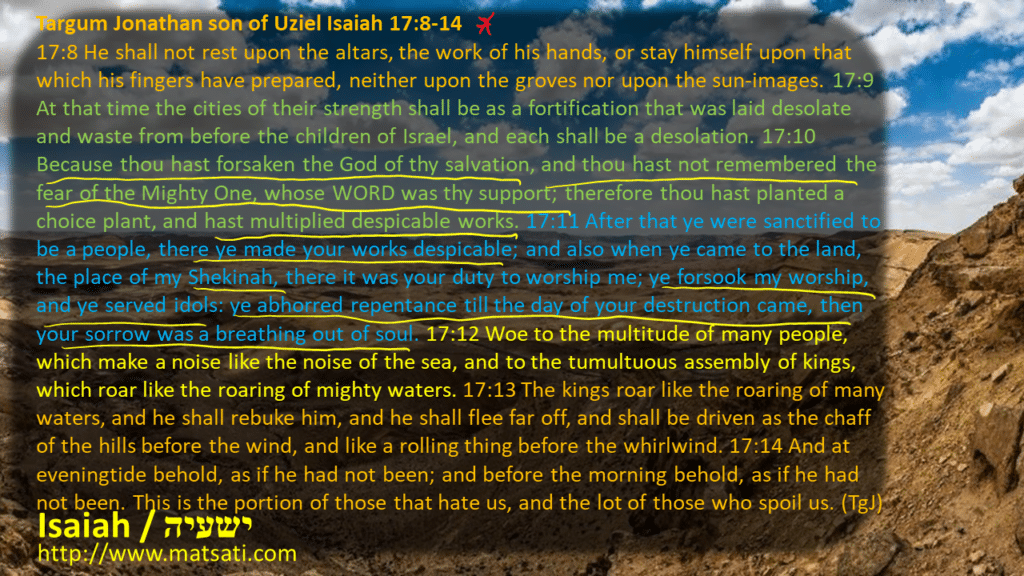
Targum Jonathan son of Uziel Isaiah 17:8-14
17:8 He shall not rest upon the altars, the work of his hands, or stay himself upon that which his fingers have prepared, neither upon the groves nor upon the sun-images. 17:9 At that time the cities of their strength shall be as a fortification that was laid desolate and waste from before the children of Israel, and each shall be a desolation. 17:10 Because thou hast forsaken the God of thy salvation, and thou hast not remembered the fear of the Mighty One, whose WORD was thy support; therefore thou hast planted a choice plant, and hast multiplied despicable works. 17:11 After that ye were sanctified to be a people, there ye made your works despicable; and also when ye came to the land, the place of my Shekinah, there it was your duty to worship me; ye forsook my worship, and ye served idols: ye abhorred repentance till the day of your destruction came, then your sorrow was a breathing out of soul. 17:12 Woe to the multitude of many people, which make a noise like the noise of the sea, and to the tumultuous assembly of kings, which roar like the roaring of mighty waters. 17:13 The kings roar like the roaring of many waters, and he shall rebuke him, and he shall flee far off, and shall be driven as the chaff of the hills before the wind, and like a rolling thing before the whirlwind. 17:14 And at eveningtide behold, as if he had not been; and before the morning behold, as if he had not been. This is the portion of those that hate us, and the lot of those who spoil us. (TgJ)
We note Isaiah 17:8-14 according to the TgJ speaks to the end result of what happens to a people who forsake the way of God and do not remember His holy and mighty acts therefore they do not remember the fear of God whose words were the foundation upon which they stood. The Hebrew word הדרך means “the way” and when written of things concerning this world, refers to a physical road or path. Metaphorically however this refers to walking in the way that God wants us to walk, and so we find the phrase דרך השם (Derekh HaShem) “the Way of God.” When we consider the path or the road, this involves making choices, whether we choose to go down one road as opposed to another. Take for example when driving a car, we take care to travel on the road that will take us to our destination, and usually it is the road that is the shortest distance. There is the idea that one can take any road they want to when driving, and never be able to actually reach the intended destination, without a map or plan for how to get to where we want to be. What Isaiah is speaking to us is concerning the choices that we make on this path of life, how the people of Israel forsook the way, the path that God wanted them to walk in, to turn from sin and their idolatry. Life presents us with an infinite number of choices, that can lead in any direction, most of which lead one away from the God of Israel, our Creator God. These things are explained by King Solomon according to Mishley / Proverbs 14:12.
ספר משלי פרק יד
יב יֵשׁ דֶּרֶךְ יָשָׁר לִפְנֵי-אִישׁ וְאַחֲרִיתָהּ דַּרְכֵי-מָוֶת:
Solomon wrote יֵשׁ דֶּרֶךְ יָשָׁר לִפְנֵי-אִישׁ וְאַחֲרִיתָהּ דַּרְכֵי-מָוֶת “there is a way that is straight/right before a man, but afterwards is the way of death.” We notice that in the English translation the translators chose to add the word “seems” saying “there is a way that seems right to a man” even though this word is not in the Hebrew text. The assumption is that if there is a way that is right before a man, but the outcome is death, then that way must “seem to be right” and actually is not the correct path. So, the idea is that it is possible for a person to fool themselves into thinking that the way in which they are proceeding in life is the “straight road” when in fact it is a road that leads to death. (See Matthew 7:13-14) There are literally billions of people in this world today who are doing this, such as Hindus, Taoists, Muslims, Buddhists, neo-Pagans, New Agers, Agnostics, Atheists, and even evangelical Christians, and Orthodox Jews. Each of these are examples of people who live in a way that is contrary to God’s holy Word and refuse to believe in His Messiah Yeshua, who fall into this category that Isaiah is speaking of according to Isaiah 17:8-14. The דֶּרֶךְ יָשָׁר straight path, suggests that there is one path that leads to truth and life, and this demonstrates that not all paths are in fact דֶּרֶךְ יָשָׁר which explains why the world tells us there are so many different ways to heaven, since the evil one is working to deceive. Because of this the Lord God has given us His word so that we might believe and understand what He expects. We note that the only true peace and life comes through faith and faithfulness to the God of Israel and His Messiah! And when difficult times come, just as Isaiah is explaining here, these gods the people trust become so small and useless. This is how Isaiah explains the situation according to the TgJ in Isaiah 17:18 saying, ח וְלָא יִסתְמֵיך עַל אֵיגֹורַיָא עֹובָד יְדֹוהִי וּדאַתקִינָא אַצבְעָתֵיה לָא יִתקַייַם וַאְשֵירַיָא וַחְנִסנְסַיָא׃ 17:8 He shall not rest upon the altars, the work of his hands, or stay himself upon that which his fingers have prepared, neither upon the groves nor upon the sun-images. (TgJ) Rashi writes on Isaiah 17:8 וְלֹ֣א יִשְׁעֶ֔ה אֶל־הַֽמִּזְבְּח֖וֹת מַעֲשֵׂ֣ה יָדָ֑יו וַאֲשֶׁ֨ר עָשׂ֤וּ אֶצְבְּעֹתָיו֙ לֹ֣א יִרְאֶ֔ה וְהָאֲשֵׁרִ֖ים וְהָחַמָּנִֽים׃ speaking of לֹ֣א יִרְאֶ֔ה וְהָאֲשֵׁרִ֖ים וְהָחַמָּנִֽים “not see the Asherim and incense-altars.” The LXX writes οὐκ ὄψονται τὰ δένδρα αὐτῶν οὐδὲ τὰ βδελύγματα αὐτῶν “not look at their trees nor their abominations.” Note how the pronoun αὐτῶν written in the genitive gives a possessive context to those whom the prophecy is against, their trees referring to the Asherim, and their abominations. The TgJ writes לָא יִתקַייַם וַאְשֵירַיָא וַחְנִסנְסַיָא “not to re-establish their Ashera and their sun-statutes.”
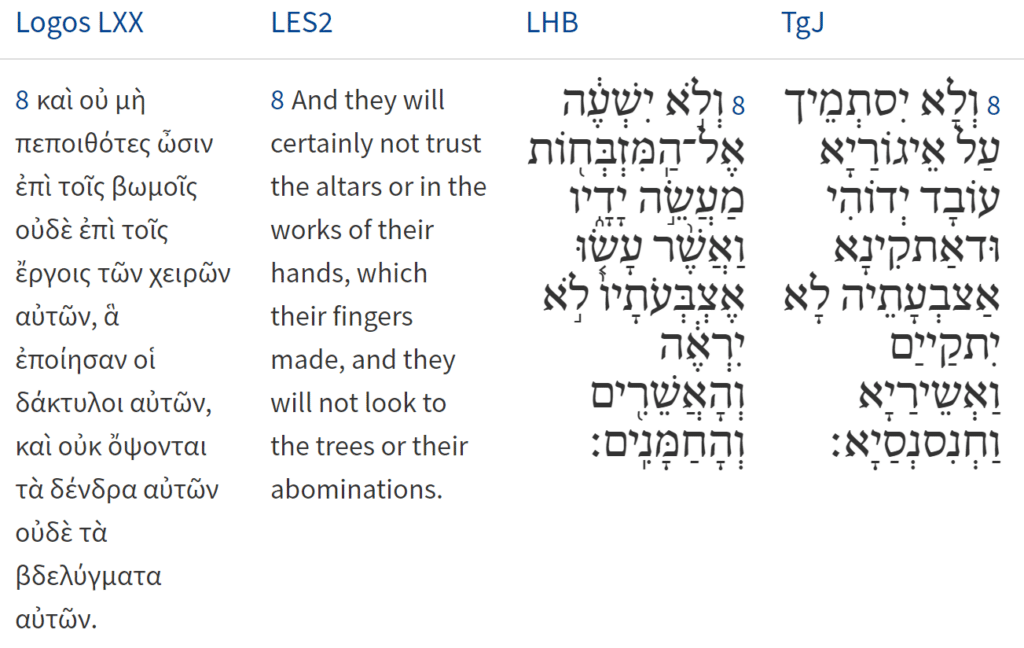
Rashi focuses upon this part of the verse saying the following:
Rashi on Isaiah 17:8 Part 1
לא יראה. לא יחשבו בעיניו:
he shall not regard [lit. he shall not see.] They shall not be important in his eyes
The idea is that these forms of religious service to their false gods will lose their appeal due to the savagery of war and their gods not being capable of delivering them from the destruction. This is how the Targum goes on describing the situation saying, ט בְעִידָנָא הַהוּא יִהוְייָן קִרוֵי תוּקפְהֹון כִכרָך דְחָרוּב וְאִתחַמַר וְאִשתְבֵיק מִן קֳדָם בְנֵי יִשׂרָאֵל וּתהֵי לְצָדוּ׃ 17:9 At that time the cities of their strength shall be as a fortification that was laid desolate and waste from before the children of Israel, and each shall be a desolation. י אְרֵי שְבַקַת אְלָה פוּרקָנִיך וְדַחלַת תַקִיפָא דְמֵימְרֵיה בְסַעְדִיך לָא אִידְכַרת בְדִיל דְאַת נְצִיבָא נִצבָא בְחִירָא וְעוּבָדִין מְקֻלקְלִין אַסגִית׃ 17:10 Because thou hast forsaken the God of thy salvation, and thou hast not remembered the fear of the Mighty One, whose WORD was thy support; therefore thou hast planted a choice plant, and hast multiplied despicable works. (TgJ) This idea that they have “forgotten … God of … salvation … rock” these things remind us of the Torah according to Devarim / Deuteronomy 32:15 and 32:18.
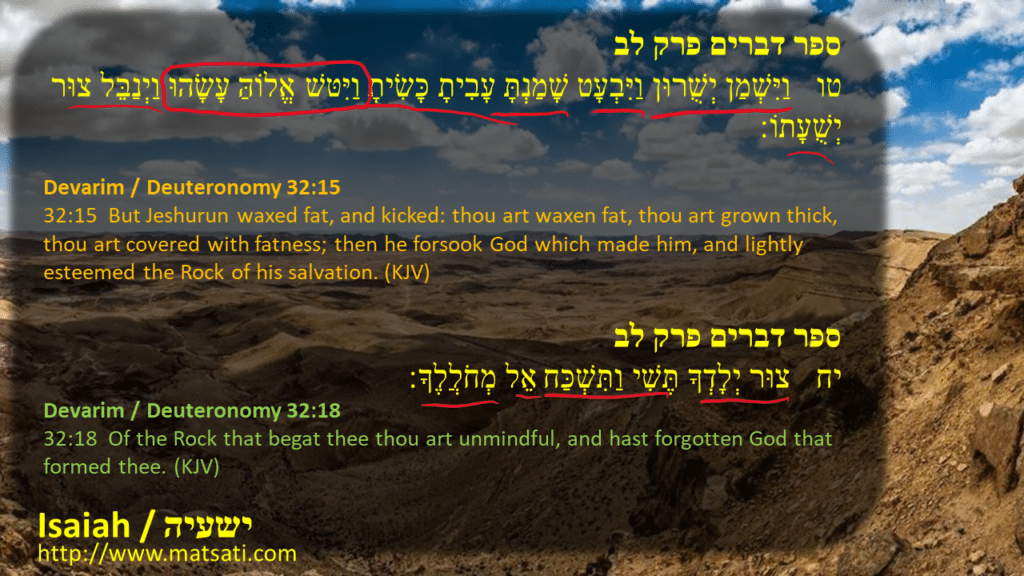
ספר דברים פרק לב
טו וַיִּשְׁמַן יְשֻׁרוּן וַיִּבְעָט שָׁמַנְתָּ עָבִיתָ כָּשִֹיתָ וַיִּטּשׁ אֱלוֹהַּ עָשָֹהוּ וַיְנַבֵּל צוּר יְשֻׁעָתוֹ:
Devarim / Deuteronomy 32:15
32:15 But Jeshurun waxed fat, and kicked: thou art waxen fat, thou art grown thick, thou art covered with fatness; then he forsook God which made him, and lightly esteemed the Rock of his salvation. (KJV)
ספר דברים פרק לב
יח צוּר יְלָדְךָ תֶּשִׁי וַתִּשְׁכַּח אֵל מְחֹלֲלֶךָ:
Devarim / Deuteronomy 32:18
32:18 Of the Rock that begat thee thou art unmindful, and hast forgotten God that formed thee. (KJV)
In each of these Torah references Moshe’s prophetic words speak to this future time when the people have grown fat, they have forgotten all of the mighty works of God and so they forgot God who made them and did not take seriously the Rock upon which they stand. We note that Moshe wrote צוּר יְלָדְךָ תֶּשִׁי וַתִּשְׁכַּח אֵל מְחֹלֲלֶךָ “Rock that birthed you forgot, and forgot the God of your trembling.” It seems a bit strange that a rock could give birth to something. This would require a miracle of God. Also note Isaiah mentions planting something and how the plant brought forth abominable works as opposed to the fruits of the Spirit. This is what Rashi points out in His commentary:
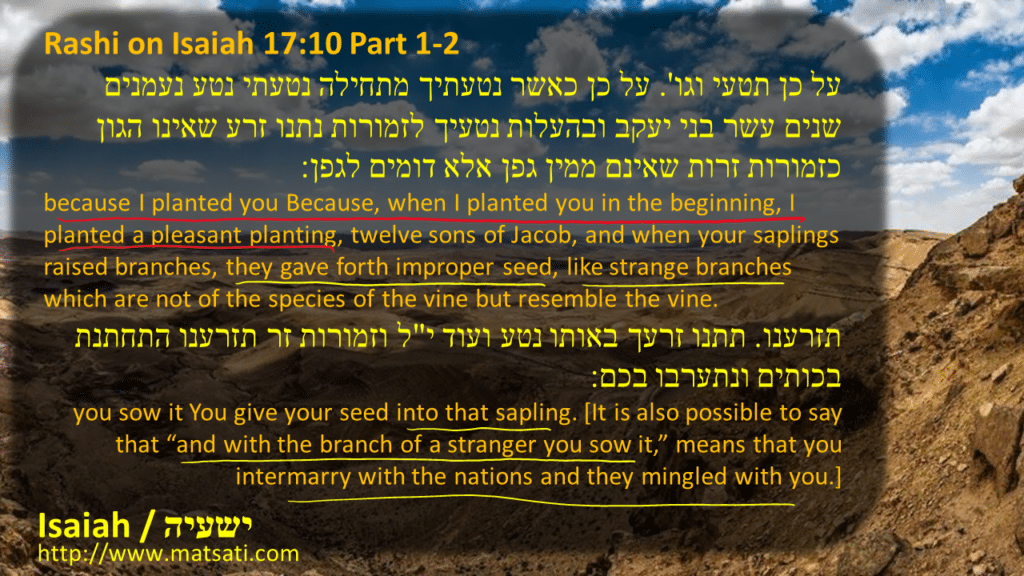
Rashi on Isaiah 17:10 Part 1-2
על כן תטעי וגו’. על כן כאשר נטעתיך מתחילה נטעתי נטע נעמנים שנים עשר בני יעקב ובהעלות נטעיך לזמורות נתנו זרע שאינו הגון כזמורות זרות שאינם ממין גפן אלא דומים לגפן: because I planted you Because, when I planted you in the beginning, I planted a pleasant planting, twelve sons of Jacob, and when your saplings raised branches, they gave forth improper seed, like strange branches which are not of the species of the vine but resemble the vine.
תזרענו. תתנו זרעך באותו נטע ועוד י”ל וזמורות זר תזרענו התחתנת בכותים ונתערבו בכם: you sow it You give your seed into that sapling. [It is also possible to say that “and with the branch of a stranger you sow it,” means that you intermarry with the nations and they mingled with you.]
Rashi describes how the Lord originally planted pleasant seeds, and they grew. There is a parallel here to the innocence of children when they are born. But after a very short period of growth, the Yetzer Hara takes over and the children choose to sin and Rashi calls these “improper seeds” with “strange branches.” The parallel is to graft in branches into a tree, and then when the branch takes root, something drastically different happens, the fruit that is produced is corrupt, or not what was originally expected. Paul wrote in Romans 11:1-18 that God grafts wild olive branches into the olive tree to become partakers of the original tree. This tree represents Israel, the promises of God, and the vast corpus of God’s written word. Paul is speaking of the mercy of God and of faith and faithfulness for entry points into the kingdom of heaven and warns the Jewish believers of believing by the mitzvot one gains entrance. This is a reversal of the revealed plan of God, that faith and faithfulness come first, and then the Torah and the commands come as a secondary aspect, to be faithful to God walking in His holy ways. According to Romans 11:11-16, Paul writes that Gentiles also have an opportunity to embrace the Messiah of Israel. Paul warns the Gentiles to remain humble because being grafted in does not mean that one is superior to the root itself. Because non-Jews are grafted into the tree, it is logical that they should learn more about the tree. Being grafted in brings the opportunity for salvation, and also offers opportunity to learn about the faith, to study all of the Scriptures, and we should make it our life’s work to grow and get to know our Father in heaven and His Messiah Yeshua, the promises of God and the Scriptures themselves upon which are faith is built! The TgJ on Isaiah 17:10 writes, י אְרֵי שְבַקַת אְלָה פוּרקָנִיך וְדַחלַת תַקִיפָא דְמֵימְרֵיה בְסַעְדִיך לָא אִידְכַרת בְדִיל דְאַת נְצִיבָא נִצבָא בְחִירָא וְעוּבָדִין מְקֻלקְלִין אַסגִית׃ 17:10 Because thou hast forsaken the God of thy salvation, and thou hast not remembered the fear of the Mighty One, whose WORD was thy support; therefore thou hast planted a choice plant, and hast multiplied despicable works. (TgJ) As plants that are grafted in, we are to produce good fruit. Just like the branch w e are to be productive offshoots for the service of the Lord. Paul writes we are to be living sacrifices in the very next chapter (Romans 12). Remember what Yeshua wrote according to John 15:8.
ΕΥΑΓΓΕΛΙΟΝ ΚΑΤΑ ΙΩΑΝΝΗΝ 15:8
8 ἐν τούτῳ ἐδοξάσθη ὁ πατήρ μου, ἵνα καρπὸν πολὺν φέρητε καὶ γένησθε ἐμοὶ μαθηταί.
John 15:8
15:8 Herein is my Father glorified, that ye bear much fruit; so shall ye be my disciples. (KJV)
Yeshua wrote that we glorify our Father in heaven by bearing good fruit. Yeshua says καὶ γένησθε ἐμοὶ μαθηταί “and we become disciples” the word μαθηταί is written as a predicate nominative meaning that we become Yeshua’s disciples through bearing good fruit. These are the fruit of the Spirit, doing those things which are consistent with the Torah commands, to not sin. (Galatians 5:22-23)
We note how God sanctifies us through His Son Yeshua, and after having faith, we are sanctified in the commands through our faithfulness to God and His holy Word. The TgJ goes on speaking of these things saying, יא בַאְתַר דְאִתקַדַשתוּן לְמִהוֵי עַם תַמָן קַלקֵילתוּן עוּבָדֵיכֹון וְאַף כַד עַלתוּן לַאְרַע בֵית שְכִינְתִי תַמָן הְוָה חָזֵי לְכֹון לְמִפלַח שְבַקתוּן פוּלחָנִי וּפלַחתוּן לְטָעְוָתָא אַרחֵיקתוּן יֹום תְיוּבָא עַד דִמטָא יֹום תְבָרְכֹון בְכֵין הְוָה כֵיבְכֹון לְמַפְחָת נְפַש׃ 17:11 After that ye were sanctified to be a people, there ye made your works despicable; and also when ye came to the land, the place of my Shekinah, there it was your duty to worship me; ye forsook my worship, and ye served idols: ye abhorred repentance till the day of your destruction came, then your sorrow was a breathing out of soul. (TgJ) Note that the TgJ speaks of God sanctifying His people, and that there is a responsibility on our part to serve the Lord, and worship Him through the way in which we live our lives! This is how the forsaking or turning away from the Lord is connected to all of these things. When one makes an idol in their lives, such as making sports their priority as opposed to fellowship with God’s people, studying God’s word, and trusting in the Lord to work a miracle as opposed to trying to force a miracle by one’s own hand. Doing these kinds of things are what Yeshua, the TgJ, and Isaiah are talking about concerning the fruits that glorify our Father in heaven.
Rashi states the following concerning these verses:
Rashi on Isaiah 17:11 Part 1-6
ביום נטעך תשגשגי. לשון סכסוך נשתגשגו זמורותיך במיני דשאים וערבובים המקלקלים ענפי הגפן כלומר במקום שנטעתיך לי לכרם שם קילקלת במעשיך הוא שאמר להם (יחזקאל כ׳:ה׳) ביום בחרי בישראל ואשא ידי לזרע בית יעקב ואודע להם בארץ מצרים ונאמר (שם) וימרו בי ולא אבו לשמוע וגו’ ואף כאן תשגשגי נתערבת בתועבות המצריים: On the day of your planting you mingled Heb. תְּשַׂגְשֵׂנִי, an expression of mingling. Your branches became mingled with sorts of grasses and mixtures that spoil the branches of the vine. That is to say that in the place where I planted you for Me as a vineyard, there you corrupted your deeds. That is what Ezekiel said to them (20:5): “On the day I chose Israel, and I lifted My hand to the seed of the house of Jacob, and I became known to them in the land of Egypt.” And it says further (verse 8): “And they rebelled against Me and they refused to obey…” Here, too, תְּשַׂגְשֵׂנִי, you became mingled with the abominations of Egypt.
ובבקר זרעך תפריחי. וליום המחרת כשהוצאתיך משם הכנסתיך לארץ גם שם זרעך הרע הפרחת: and in the morning you cause your seed to blossom And on the morrow, when I took you out of there, and I brought you into the land, there, too, your evil seed you caused to blossom.
נד קציר ביום נחלה. גדיש של קציר רע אשר הוכיח ביום נחלה אותו קציר הגיע ליום צרה: a heap of harvest on a day of sickness a heap of bad harvest that lies by day and by night, that harvest is stricken ill, it has reached a day of distress. [Rashi in printed editions.] [Since it is difficult to make sense of this comment of Rashi, Parshandatha prefers the reading of most mss.:] a heap of harvest on a day of sickness a heap of bad harvest, as “on a day of sickness” proves, that harvest reached a day of distress.
נד הוא לשון גובה וכן נצבו כמו נד נוזלים (שמות טו) וכן כונס כנד (תהלים לג) ואין נד ונוד שוים: a heap Heb. נֵד. This is an expression of a tall heap. Comp. (Exodus 15:8) “Running water stood erect like a heap (נֵד).” Also (Ps. 33:3), “He gathers like a heap (כַּנֵּד).” [The words:] נֵד and נוֹד are not the same [i.e., נֵד is a heap or a stack, and נוֹד is a flask.]
וכאב אנוש. שנשלמת שכרך: and mortal pain that you were paid your reward.
אנוש. נעכר בחולי רע וכן ויאנש (שמואל ב’ יא) וכן כי אנושה מכותיה (מיכה א׳:ט׳), ד”א ובבקר זרעך תפריחי עד שלא בא השרב הפרחתם ודרך הכרם לפרוח בבא השרב והמפריח בבקר אינו הגון זה במדרש רבי תנחומא: mortal Heb. אָנוּשׁ, distressed by severe illness. Comp. (II Sam. 12: 15) “And he became mortally ill (וַיֵּאָנַשׁ),” also (Micah 1:9), “For her wounds are mortal (אֲנוּשָׁה) .” Alternatively and in the morning you cause your seed to blossom Before the heat comes, you have blossomed, and it is customary for the vineyard to blossom when the heat comes, and the one that blossoms in the morning does not thrive. This is in the Midrash of Rabbi Tanhuma (Sh’lach 12).
Rashi speaks of a very interesting phenomenon of mingling different things together. The example given is planting and the end result is corrupt fruit or the plant itself won’t grow. This reminds us of mixing the truth with a lie. Paul wrote saying “They exchanged the truth about God for a lie, and worshiped and served created things rather than the Creator—who is forever praised. Amen.” (Romans 1:24-25) Once a nation turns away from the Lord, all kinds of Chaos begins to happen. Rashi describes this as “in the place where I planted you for Me as a vineyard, there you corrupted your deeds.” The point is that the blending of truth and lies does not work, as John wrote “God is light, and in him is no darkness at all.” (1 John 1:5) The word תְּשַׂגְשֵׂנִי mingling draws in the idea of someone doing something, preparing something such as a meal, and they don’t know what they are doing or they don’t have a recipe etc. Trying to make a meal and not doing it right can lead to a number of problems, especially nutritional deficiencies and taste can make the meal completely unpalatable (inedible). Consider eating donuts for breakfast, lunch, and dinner simply because it tastes good. Imagine the outcome after an extended period of time? The idea Rashi is drawing out is how the mingling with the ways of the nations reaps the reward of mortality (death). If we consider these things in their application for today, are we mingling the ways of the nations into our lives, or thought processes? Consider the liberal LGBTQ mentality that has been integrated into the church today on a massive scale. This is the idea of mingling a lie with the truth. In the NT, John appeals to God’s people to know the truth “But you have an anointing from the Holy One, and you know all things. I have not written to you because you do not know the truth, but because you know it, and that no lie is of the truth.” (see 1 John 2:20-28) The reason we know the truth is because of God’s Word and because God’s Spirit is with our spirit. Paul wrote in 2 Timothy 4:22 “The Lord be with thy spirit.” He also wrote a similar saying according to 2 Corinthians 3:17 Now the Lord is the Spirit, and where the Spirit of the Lord is, there is freedom. (NIV) Our bodies being the Temple of God, the Spirit of the Lord dwells within. We consider the weightiness of these things of what Rashi is drawing out on the word תְּשַׂגְשֵׂנִי mingling and truth.
The TgJ goes on saying, יב יֵי הְמֹון עַמְמִין סַגִיאִין דִכמִהמֵי יַמָא הָמַן וְאִתרְגֹושַת מַלכְוָן דִכאִתְגֹושַת מַיִין תַקִיפִין מִתרַגשִין׃ 17:12 Woe to the multitude of many people, which make a noise like the noise of the sea, and to the tumultuous assembly of kings, which roar like the roaring of mighty waters. (TgJ) This verse, the way TgJ renders Isaiah 17:12 reminds us of Psalms 2:1-12 and how the nations rage against God and His Messiah. (Tehillim / Psalms 2:1 Why do the heathen rage, and the people imagine a vain thing? 2:2 The kings of the earth set themselves, and the rulers take counsel together, against the LORD, and against his anointed, saying, 2:3 Let us break their bands asunder, and cast away their cords from us. 2:4 He that sitteth in the heavens shall laugh: the LORD shall have them in derision. 2:5 Then shall he speak unto them in his wrath and vex them in his sore displeasure. 2:6 Yet have I set my king upon my holy hill of Zion. KJV לָ֭מָּה רָגְשׁ֣וּ גוֹיִ֑ם וּ֝לְאֻמִּ֗ים יֶהְגּוּ־רִֽיק׃ יִ֥תְיַצְּב֨וּ׀ מַלְכֵי־אֶ֗רֶץ וְרוֹזְנִ֥ים נֽוֹסְדוּ־יָ֑חַד עַל־יְ֝הוָה וְעַל־מְשִׁיחֽוֹ׃ נְֽ֭נַתְּקָה אֶת־מֽוֹסְרוֹתֵ֑ימוֹ וְנַשְׁלִ֖יכָה מִמֶּ֣נּוּ עֲבֹתֵֽימוֹ׃ יוֹשֵׁ֣ב בַּשָּׁמַ֣יִם יִשְׂחָ֑ק אֲ֝דֹנָ֗י יִלְעַג־לָֽמוֹ׃ אָ֤ז יְדַבֵּ֣ר אֵלֵ֣ימוֹ בְאַפּ֑וֹ וּֽבַחֲרוֹנ֥וֹ יְבַהֲלֵֽמוֹ׃ וַ֭אֲנִי נָסַ֣כְתִּי מַלְכִּ֑י עַל־צִ֝יּ֗וֹן הַר־קָדְשִֽׁי׃) David recognizes the roaring of the kings of the nations who take their stand against God and His Messiah. This is how the TgJ concludes on Isaiah 17 saying, יג מַלכִין דִכאִתרְגֹושַת מַיִין סַגִיאִין מִתרַגשִין וְיִנזֹוף בֵיה וְיִערֹוק מֵרַחִיק וְיִתרְדֵיף כְמֹוץ טוּרַיָא מִן קֳדָם רוּחָא וּכגִלגְלָא קֳדָם עַלעוּלָא׃ 17:13 The kings roar like the roaring of many waters, and he shall rebuke him, and he shall flee far off, and shall be driven as the chaff of the hills before the wind, and like a rolling thing before the whirlwind. יד לְעִידָן רַמשָא וְהָא כִיד לָא הְוָה עַד לָא הְוָה צַפרָא דִכלָיְתֹוהִי דֵין חוּלָק לְאָנִסַנָא וַעְדַב לְבָזְזַנָא׃ 17:14 And at evening tide behold, as if he had not been and before the morning behold, as if he had not been. This is the portion of those that hate us, and the lot of those who spoil us. (TgJ) The end result is the Lord God will blow upon these rebellious kings and they will scatter like chaff in the wind. The Midrash Tanchuma, Ki Tisa 4.3 states the following concerning this verse.
Midrash Tanchuma, Ki Tisa 4:3
However, the rabbis held that this verse refers to the nations of the world. The idolaters are many (rabim), as it is written: The uproar of many peoples (Isa. 17:12). They said to Israel: You are a nation that heard at Sinai: I am the Lord Thy God, thou shalt have no other gods before Me (Exod. 20:3), yet at the end of forty days you said of a calf: This is your god, O Israel (ibid. 32:4). How can they enjoy salvation, since it says: There is no salvation for him in God (Ps. 3:3)? But Thou, O Lord, art a shield about me suggests that Israel cried out: Master of the Universe, do You agree with them, since You have said: He that sacrificeth unto the gods shall be utterly destroyed (Exod. 22:19)? A shield about me alludes to the merit of the fathers; my glory implies that You will cause your Shekhinah to dwell in our midst when You said: Build Me a Sanctuary that I may dwell among them (ibid. 25:8); and lifter up of the head indicates that instead of sentencing us to destruction, You permitted us to lift up the head, that is, to be forgiven because of Moses, as it is said: Thou liftest up the head.
The rabbis connect idolatry to the roaring nations and the kings who rage against the God in heaven and His Messiah. Idolatry however looks drastically different today from what it once was. In the ancient times, idols were inanimate figures and statues made of gold, silver, and wood. Today idols come in various forms such as sports, personal image, materialism, sex, money, anything that takes us away from the Lord God Almighty. Idolatry is an issue of the heart and can thus only be broken by a transformation of the heart. The Torah states according to Shemot / Exodus 22:19:
ספר שמות פרק כב
יט זֹבֵחַ לָאֱלֹהִים יָחֳרָם בִּלְתִּי לַיהוָֹה לְבַדּוֹ:
Shemot / Exodus 22:20
22:20 “Whoever sacrifices to any god other than the Lord must be destroyed. (NIV)
The idea is that the one who sacrifices to any other god, the Lord Himself, will destroy such a person. We note the parallels to the sacrifice of praise according to David in the Psalms. Bringing a sacrifice is not limited to physically bringing an animal to a pagan temple and slaughtering the animal. Idols are anything that takes God’s place in our lives giving fulfillment, satisfaction, security, or significance. These are the things that Moab, Damascus, and even Israel attributed to their false gods. The Lord God Almighty is the One who truly gives us these things. We note in the NT text that we are told that by our faith in Yeshua, our Father in heaven gives us Shalom (שלום, peace). The interesting aspect of the word שלום is that the word שלם can also mean complete. The idea is that when God gives us His peace, His shalom, we are made complete. In order to have the capability to turn from these things and to the One true God, is by faith in Yeshua the Messiah, who gave his life for us. Yeshua taught us how to live our lives for the Lord walking in God’s Torah (Instruction) and how we are to put our Father God in heaven first in our hearts and in our lives. Paul wrote in Colossians 3:5 saying, “Put to death therefore what is earthly in you: sexual immorality, impurity, passion, evil desire, and covetousness, which is idolatry.” We note that each of these things fail to give peace and life, whereas we are set free from these things in Yeshua, and it is only in the Lord that we find the true meaning of life and joy! Isaiah, the TgJ, and the rabbinic literature are as a whole identifying the root issue in life, that we are to turn from idolatry regardless of what shape or form it takes, and to trust in the Lord. We need to ask ourselves, are our needs really being met by these things we put all of our time into that are separate from the Lord? David wrote in the Psalms saying according to Tehillim / Psalms 37:4 “Delight yourself in the Lord, and he will give you the desires of your heart.” (ESV, וְהִתְעַנַּ֥ג עַל־יְהוָ֑ה וְיִֽתֶּן־לְ֝ךָ֗ מִשְׁאֲלֹ֥ת לִבֶּֽךָ)
